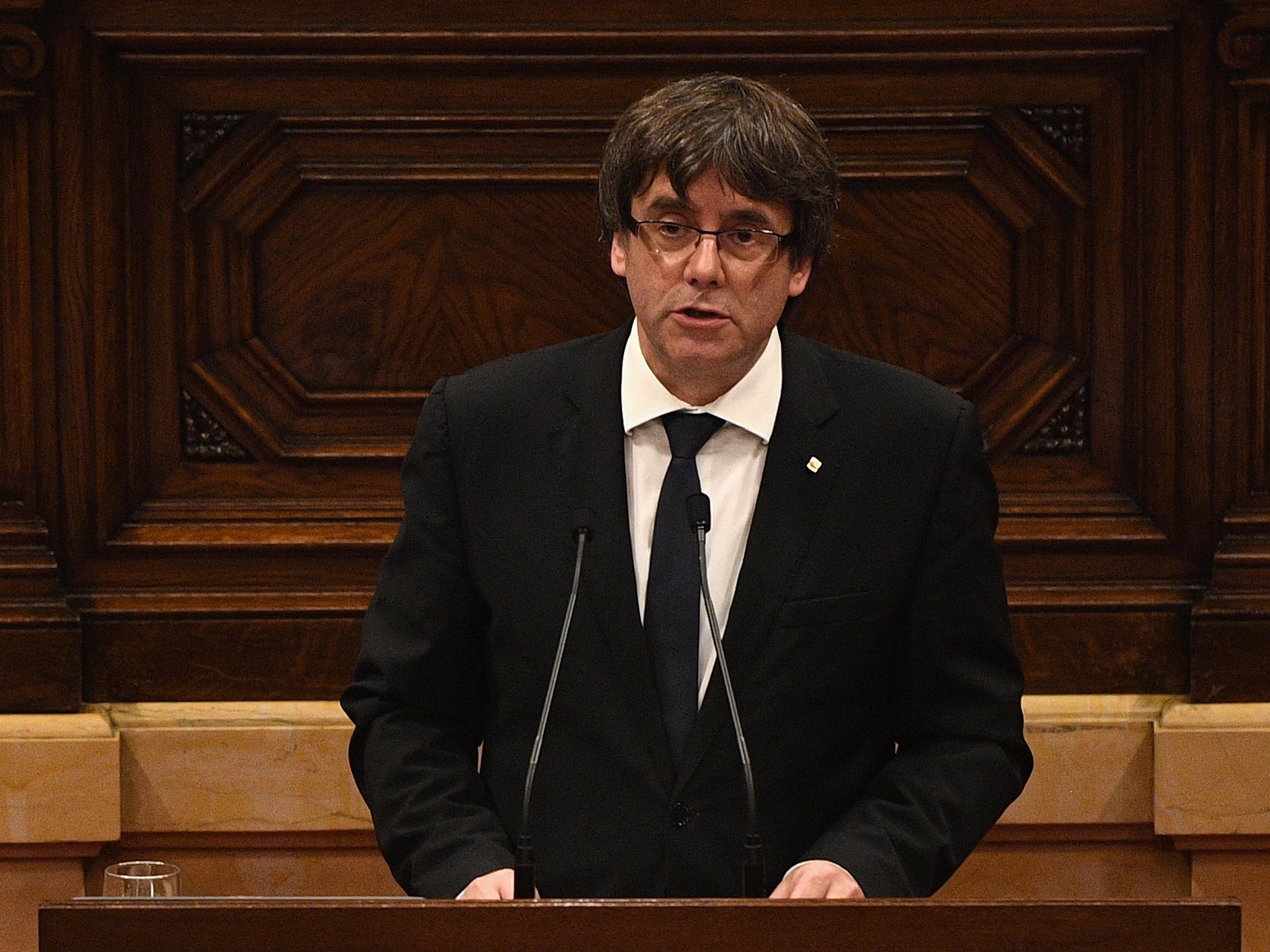Rifts are emerging in the Catalan independence movement after President Puigdemont’s speech
Puigdemont told the crowd that he would ask the Catalan Parliament to suspend the effect of the declaration of independence to favour a negotiation with the Spanish government. Most demonstrators became silent, while some groups started booing

Your support helps us to tell the story
From reproductive rights to climate change to Big Tech, The Independent is on the ground when the story is developing. Whether it's investigating the financials of Elon Musk's pro-Trump PAC or producing our latest documentary, 'The A Word', which shines a light on the American women fighting for reproductive rights, we know how important it is to parse out the facts from the messaging.
At such a critical moment in US history, we need reporters on the ground. Your donation allows us to keep sending journalists to speak to both sides of the story.
The Independent is trusted by Americans across the entire political spectrum. And unlike many other quality news outlets, we choose not to lock Americans out of our reporting and analysis with paywalls. We believe quality journalism should be available to everyone, paid for by those who can afford it.
Your support makes all the difference.Tens of thousands gathered last Tuesday night in Barcelona to follow Catalan President Carles Puigdemont’s speech on the results of the self-determination referendum that took place on the 1 of October.
Catalans (and Spaniards) had been holding their breath during the last days, as there had been much speculation about the exact content of the speech. Would Puigdemont make a symbolic declaration of independence or a binding one? Would he suspend the declaration to force Spanish President Mariano Rajoy’s government to negotiate?
Some of the independence movement sympathisers who gathered in Barcelona to attend Puigdemont’s speech seemed resigned to hearing some kind of soft declaration of independence, without any immediate effect. As a 60-year-old woman put it, “one thing is the declaration that we hope and a different one is the declaration that we will have”. For many independence supporters, the immediate proclamation of a Catalan Republic did not appear as a real possibility, due to the firm opposition of the Spanish government and the lack of international support to secession.
However, the beginning of Puigdemont’s speech was received with enthusiasm by the crowd gathered at Lluís Companys boulevard, named after the president of Catalonia who briefly declared the Catalan Republic in 1934 – during the Spanish Second Republic – and was executed by Francisco Franco’s dictatorship in 1940.
Puigdemont was supposed to address the Catalan Parliament at 6pm but there was a one-hour delay, due to last-minute negotiations between the regional government and the Candidatura d’Unitat Popular (CUP), the far-left independentist party that supports Puigdemont-led government. The strange alliance between Puigdemont’s centre-right party Partit Demòcrata Català (PDCat), Vice-President Oriol Junqueras’ Esquerra Republicana de Catalunya (ERC) and the CUP has been one of the main strengths of the independence movement over the last years, but that unity seems threatened by the suspension of today’s declaration.
After stressing the overwhelming victory of the independence option in the referendum – declared illegal by the Spanish Constitutional Court and heavily repressed by the Spanish police – Puigdemont declared the following: “At this historical moment as the President of Catalonia, I want to follow the people's will for Catalonia to become an independent state”. The sentence was followed by a prolonged applause by the crowd, and thousands started shouting “Independència!”, as the President’s statement was interpreted as the genuine declaration of independence which many were expecting.
However, enthusiasm quickly declined, as Puigdemont immediately added that he would ask the Catalan Parliament to suspend the effect of the declaration of independence to favour a negotiation with the Spanish government. Most demonstrators became silent, while some groups started booing Puigdemont. After the President’s speech, the mood of the public was ambivalent. Many quickly abandoned Lluís Companys boulevard, while others tried to keep the morale up – for instance, two girls in their twenties remained confident that there would be an effective declaration of independence “within a few days”.
The disappointment of the CUP party with Carles Puigdemont’s speech was clearly expressed by its parliamentary spokesperson, Anna Gabriel, who underlined that the anticapitalistic party does not renounce to an effective declaration of independence. Arran, the young branch of the CUP, used a more radical language, describing Puigdemont’s speech as “inadmissible treason”. Soon after, all the independentist Catalan MPs (including the ones belonging to CUP) signed a non-binding declaration of independence, but this symbolic act will probably be insufficient to satisfy many deceived independentist militants.
Puigdemont has put the Spanish government in a difficult position with his carefully calculated speech, but he has failed to meet the expectations of the most radical sector of the independentist movement. They are not very numerous -the CUP obtained only 8 per cent of the vote in the last regional elections – but they have a great ability to mobilise their militants, and Puigdemont’s government depends on the CUP’s parliamentary support. In the following days, we will see how serious are the division within the independentist bloc, and whether they may affect the prospects of the movement.
Join our commenting forum
Join thought-provoking conversations, follow other Independent readers and see their replies
Comments